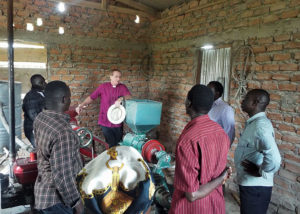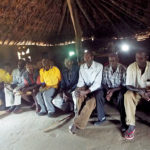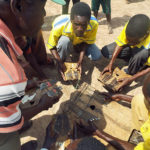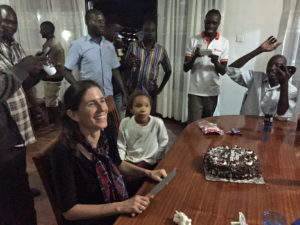[Editor’s Note: Bishop McConnell will be in a remote of Katakwi until Thursday, July 7, and will not be posting until then. Click the images below for larger versions]
The village of Olwa (pronounced oh-LOO-ah) is about an hour’s drive from Soroti, north into Serere, a district that shares the shoreline of Lake Kioga. The rains came Sunday night, and the road is just wet enough to keep down the dust. The landscape is typical of Teso— fields of grass punctuated by mango trees and interspersed with crops of sorghum, millet, maize and groundnuts. Everything is green in the early afternoon sun. You wouldn’t know that, in many villages, people are close to starvation because of crop failure this season.
Uganda is blessed with incredibly fertile ground and two rainy seasons, which means two harvests in a normal year. But the combination of global warming and local deforestation have produced radical quirks in the microclimate of Teso: too much rain, then not enough, late rains, early rains— you name it. The result this year is a lot of hungry people. They have replanted cassava, which will enable them to survive if it matures, but that will not be before the mangoes run out.
You can see, in this reality, why food security is so important. Farmers need efficient and economical ways to process their crops— to turn cassava into flour, groundnuts into oil, to de-hull their corn and polish their rice. These simple steps more than triple the market value of a crop, which translates into desperately needed cash to pay school fees, buy medicine, and help people through times of scarcity.
The multi-function platform at Olwa gives farmers local control of this process. I have written about Pilgrim’s MFP program before, but I will summarize again the basics.
The MFP is a diesel engine connected by belts and a drive shaft to any number of accessories. In Olwa there are three— a grinder for cassava, an oil press for g-nuts, a maize de-huller and a rice polisher. In Olwa, as in the four other sites, Pilgrim has supplied the machinery in partnership with Columbia University. The farmers are responsible for everything else. They first must pay for and build a brick shelter. They must organize as a co-operative— essentially a grange very much like those that were popular in rural ares in the US in the19th and early 20th centuries. The members pay dues which in turn support fuel and maintenance and also contribute to the co-operative’s working capital. In return the members get a reduced rate in crop processing and a stake in any investment made by the co-operative.
In Olwa, the farmers’ group is governed by a 21-member executive committee which oversees the program on behalf of eight villages. Since non-members can process crops as well on a pay-as-you-go basis, this one MFP serves more than 12,000 people. It is more than a hedge against hunger. It puts the farmers’ destiny firmly in their own hands: dignity and power.
That may be why the greeting we receive is so enthusiastic, as we pull through Olwa and park by the MFP shelter. A parade of villagers comes down the rutted path ahead of us, women giving their famous high-pitched ululation, led by a traditional Iteso band. This is a “welcome song” and it goes on for some time, as more and more people come from the fields to gather around us.
We go into the shelter, surround the machines, and the treasurer Edith Ojur, begins with a prayer. Then the committee chair Sam Oriokot narrates a tour of the equipment. It is really exciting to see it all in place, in such good shape, well-used and carefully maintained. Pilgrim’s extension agent, Titus, fills in the technical details. Because folks in the countryside speak English with varying degrees of fluency, there is a constant back and forth in two languages. I ask a few questions, then we all are led to a council hut for a formal “program” with the elders and executive committee.
I am used to the elegant seriousness with which Ugandans conduct meetings, and I have heard several beautiful speeches, but nothing as poignant as Edith’s tribute to Pilgrim in her introduction. She describes what ordinary life looked like before the MFP— how they were forced to carry their rice, corn and cassava long distances to mills in Soroti where they were routinely cheated, receiving back considerably less than they had brought. They would have to pull their children out of school to help carry sacks of their crops for processing, and during the rainy season, sometimes the cassava flour would be soaked before they could get it back home. Edith, who is a midwife, notes that pregnant women would sometimes miscarry on the road, and that people were often so overwhelmed with their own problems that they had little time or inclination to help their neighbors. But all that has now changed, she says. People generally have enough, are healthier, able to spend in more productive ways the time they once used on the road. There is a new spirit of co-operation, not only in the executive committee, but across the villages. The groups has invested some of their earnings to buy a piece of land next to the MFP which will enable them eventually to expand. An open discussion on expansion follows, including planting high-value crops, and building more capital for the group, with a final appeal to the Pilgrim board for relief aid directed at the poorest families.
There are more speeches, more gratitude expressed, more songs and prayers and a photo-op. We are escorted back to our car by the same band that greeted us, and arrived back home in time to celebrate the Fourth of July with our CEO, Dr. Dorothy Echodu, who has just arrived from Seattle with her daughter Ellie. Our Ugandan friends throw a great party kicked off by prayers and the singing of both our national anthems, the Americans singing ours, the Ugandans singing theirs.
And no, they can’t remember the second verse of their anthem, either!




